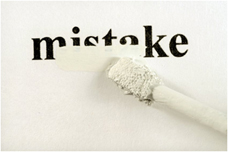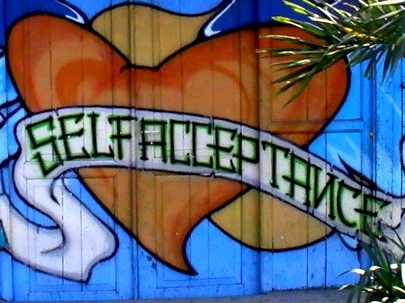 It happens. It happens.
To all of us.
All the time.
In fact, we’re SUPPOSED to make mistakes. That’s how we learn.
So why do we feel so bad when we do?
Maybe it’s because so many parents, teachers, coaches (of the sports variety) and others give us such a hard time when we err. Maybe it’s because we simply find it difficult to accept that making mistakes is part of being human. That no one ever learned a thing by being perfect.
The fact is that no one gets even close to perfect without making countless mistakes keeping in mind Edison’s admitted 1,000 before coming up with the light bulb.
So ignore everything bad you’ve heard in the past about mistakes.
Mistakes are good. Mistakes are healthy. Mistakes are about learning. Ultimately, mistakes teach us a lot – even if it’s just about forgiveness.
 No Comments »
No Comments »
 Posted by Joyce K Reynolds in Uncategorized
Posted by Joyce K Reynolds in Uncategorized
 When you lead a relatively disciplined lifestyle – no smoking, no drinking, no meat, no…. well you get it – so, as I was saying, when you give up all manner of sinful excess, it’s easy to feel entitled to a little sweet treat now and then. When you lead a relatively disciplined lifestyle – no smoking, no drinking, no meat, no…. well you get it – so, as I was saying, when you give up all manner of sinful excess, it’s easy to feel entitled to a little sweet treat now and then.
You know, the delicious melt of dark chocolate Kisses on the roof of your mouth. The happy little hum that accompanies a bowlful of Ben and Jerry’s fat-free-if-you-please Fro-Yo. The utter creativity of a few strawberries dipped in sour cream then plunged into a dish of soft brown sugar.
YUM.
I mean – what’s the harm?
Well, the problem for some of us is that the ‘now and then’ quickly becomes more now than then.
And as the sweets increase, so do the sinus infections, skin rashes, highs and lows, not to mention the pounds.
It all seems pretty unfair. In fact, I find it downright annoying.
But that’s the way it is. Oh, I can have sugar. After all, it’s legal. In fact, it’s more than plentiful in everyday foods. I just have be prepared for the consequences.
 1 Comment »
1 Comment »
 Posted by Joyce K Reynolds in Uncategorized
Posted by Joyce K Reynolds in Uncategorized
 I wasn’t looking. Or craving. Or even resisting. I was just in neutral. I wasn’t looking. Or craving. Or even resisting. I was just in neutral.
Then along came Jaxx.
No one knows if he strayed or was abandoned. Someone simply found him and dropped him off at the VCA Academy Hospital here in town. Lucky kitty, he.
Jaxx weighed just 15 ounces and had a serious viral infection that compromised his lungs and eyes. He was one sick little kitty. But, thanks to the generous and caring vets who gave him the most robust, top-quality care, he got better until it looked like he was ready for a real home.
His picture was posted some months ago but it was just last week that one of my friends spotted it, tore it off the wall and handed it to me. I went to visit Pirate as he was then called – you know, that one eye problem – who was hidden away in the isolation ward. He wasn’t eager to come out of his cage and interview. There were continuing problems with his health. I had questions. And – well – my heart hadn’t begun to melt quite yet.
Then Dr. WIlber called back. I went for another visit. And that was that. Oh, except for one other quirky little thing.The intake vet who had recently joined this practice was the very same doctor who had seen me and SugarFoote through his final days. Luck? Fate? Coincidence? Who knows. I guess I was just ready to take a chance on love…again.
 1 Comment »
1 Comment »
 During one of his lectures Buddhist teacher, Piya Tan, talked about what the Buddha meant when he said that “nothing is worth clinging to.” During one of his lectures Buddhist teacher, Piya Tan, talked about what the Buddha meant when he said that “nothing is worth clinging to.”
Tan explained that if we understand nothing is worth clinging to, and move on with happiness, whatever we do next will be even better. He said that this gives us an inner sense of satisfaction and happiness that no one can take away. That we suffer pain when we depend on external things and others for recognition and happiness. This all made good sense to me.
So I started thinking about what it means to not cling to anything. Really. Anything.
I was reminded of the day over twenty years ago when I did the very first lesson in A Course in Miracles. The instruction for Lesson One is to sit quietly and look around saying, “Nothing I see in this room (on this street, from this window, in this place) means anything.”
All was going well until my eyes fell on my cat, Sug. Next on a photo of one of my nephews. Hm. Now this was getting challenging. I felt tension arise at the mere thought that my cat or my nephew had – well – no meaning! A sense of panic followed as if in some way I was renouncing them. That they might simply vanish before my eyes if I pursued this exercise.
In those seconds, I wanted to cling to them. To affirm how important they were. To reject the thought that they had ‘no meaning.’
Then I got it.There was nothing mystical or destructive going on. This was just another way of helping me get free of the belief that I need to cling to things. Try in some way to make them last or have more meaning. In this letting go process I became acquainted – however, fleetingly – with a way of being in the moment and able to live like beautiful flowers “Who are not anxious about tomorrrow but live with ease in the timeless now and are provided for abundantly.”
Quite a reward for letting go.
 No Comments »
No Comments »
 Regarding CEOs who might quit their posts if their pay was capped, management expert Tom Peters asked, “Who cares?” He went on to say, “…if all the top executives of the Fortune 500 companies were exiled to Elba, ‘performance of their companies would not on average deteriorate.’” Regarding CEOs who might quit their posts if their pay was capped, management expert Tom Peters asked, “Who cares?” He went on to say, “…if all the top executives of the Fortune 500 companies were exiled to Elba, ‘performance of their companies would not on average deteriorate.’”
So – without getting into the ‘who cares’ and ‘if all’ of it – what about the money? Is that the ONLY thing that most CEOs care about?
In a late 2004 study of two hundred and eight Fortune 1000 CEOs, a mere 7% indicated that money was their top motivating factor. A near majority – 43% – said they were largely motivated by fear (most likely of losing their jobs!) and another 22% indicated that their top motivator was power.
Five critical years have passed since NY-based Jericho Communications revealed this study, so we might want to ask – could things have changed that much? For all the recent and very bad press, it’s a fair question.
Maybe I’ve just been lucky, but in the nearly fifteen years I’ve been Coaching CEOs (among others), I have not encountered one such executive who didn’t care more about the culture, well-being, intellect and overall profitability of their organizations than about their own income.
Does that mean there isn’t a class of CEOs who thinks only of their own wealth? Absoutely not.
And we don’t even have to rely on the fictional Gordon Gekko to prove the point. There’s the now-deceased Ken Lay followed by John Thain, Patrick Soon-Shiong, Richard Baker and so many others who are pocketing millions – even billions – while workers are being laid off.
But, there’s also a long list of admirable CEOs that includes people like Genentech’s Art Levinson, Eric E. Schmidt of Google, and Adobe CEO, Shantanu Narayen.
Bottom line? It’s not always about the CEO’s personal bottom line and it’s unfair to negatively brand the whole category.
 No Comments »
No Comments »
 Posted by Joyce K Reynolds in Uncategorized
Posted by Joyce K Reynolds in Uncategorized
 This is the second post my girlfriend, Maureen, has inspired on the topic of self-acceptance. We’ve been talking a lot about it and how it trumps self-esteem and self-confidence as perhaps the most important goal in life. This is the second post my girlfriend, Maureen, has inspired on the topic of self-acceptance. We’ve been talking a lot about it and how it trumps self-esteem and self-confidence as perhaps the most important goal in life.
Why? Because self-acceptance is an unconditional gift that only we can give ourselves.
Noted psychologist, Dr. Albert Ellis, has written extensively on the merit of seeking self-acceptance rather than self-esteem which he sees as not only conditional but disempowering. It all makes sense if we see that most often our self-esteem is based on what others think of us and what we do rather than how we feel and think about ourselves.
Harry Emerson Fosdick makes it even more appealing to seek self-acceptance. He said, “One must have the adventurous daring to accept oneself as a bundle of possibilities and undertake the most interesting game in the world, making the most of one’s best.”There’s something so exciting in thinking about myself as ‘a bundle of possibilities’ instead of constantly finding fault as if there was some redemption or reward in that.
In fact, self-acceptance might just be the ultimate life goal.
 No Comments »
No Comments »
 Posted by Joyce K Reynolds in Uncategorized
Posted by Joyce K Reynolds in Uncategorized
 No matter how we might fight it, English poet John Donne had it right when he wrote in his Devotions Upon Emergent Occasions, “No man is an island entire of itself.” No matter how we might fight it, English poet John Donne had it right when he wrote in his Devotions Upon Emergent Occasions, “No man is an island entire of itself.”
Troubled times are probably the ones that prove this most. Because it’s clear to even fiercely independent people like me that trying to go it alone during tough times is just not smart. In fact, going it alone during good times is probably just as unhelpful.
And, maybe that’s our big wake-up call.
The truth is that the more enriched our society has become the more we’ve lived as if we don’t need one another. And, the less – on real and human levels – we share, care and reach out for the community of family, friends, neighbors and colleagues. In many cases, our money has protected us from the true intimacies of life.
One of my real friends recently sent me a telling sketch of ‘simple vs. real friends.’ Among others, I was struck by this passage: “A simple friend has never seen you cry. A real friend’s shoulder is soggy from your tears.”
While I might cringe at the thought of breaking down in front of another with sadness, jitters, grief or confusion, I know that when I’ve let it happen I feel a sense of closeness and healing that is incomparable.
This is not about asking others to ‘fix’ your life. Or listen endlessly to wallowing. Or leaning helplessly on someone. It’s about connecting with the whole and real world of people who have natural, deep, sometimes -brave-sometimes-scared feelings. It seems we are in a perfect time to reap the warm and loving rewards of NOT going it alone.
 No Comments »
No Comments »
 Posted by Joyce K Reynolds in Uncategorized
Posted by Joyce K Reynolds in Uncategorized

Even for those of us who are so used to feeling anxious or scared that we hardly notice, fear has now gotten our full attention. Whether it’s about our personal insecurities, the job, finances, relationships, the future or war – fear seems to be gnawing at our every conscious nerve. This level of fear can either propel us into futilely trying harder to control situations, lead us to hopelessness and self-neglect or motivate us to stamp it out of our lives – no matter what.
Fear is contagious. It spreads like wildfire in a dry season. And often is far worse than conditions or facts warrant. Furthermore – as Franklin D. Roosevelt suggested when he said, “The only thing we have to fear is fear itself” – fear can actually bring on problems that would otherwise not occur. A very good reason to refuse to let fear rule your mind.
How, then, do we manage our fears especially in such troubled times?
. Be realistic about the level of risk or challenge you are facing.
. Do not dramatize. Reality can be bad enough without ‘awfulizing.’
. Look for positive inspiration EVERYWHERE.
. Find a safe outlet for expressing your fears. Sharing with a trusted friend can be very helpful as l long as he or she does not go negative.
. Relentlessly focus on the good stuff and reside in gratitude.
. Find time and energy to help others.
 No Comments »
No Comments »
 Posted by Joyce K Reynolds in Uncategorized
Posted by Joyce K Reynolds in Uncategorized
 I am frequently reminded both personally and professionally that along the route to self-discovery and growth we can encounter messy business. That sometimes things get worse before they get better. That it’s essential to keep going especially when things get tough or we can easily wind up in a worse place than when we started. I am frequently reminded both personally and professionally that along the route to self-discovery and growth we can encounter messy business. That sometimes things get worse before they get better. That it’s essential to keep going especially when things get tough or we can easily wind up in a worse place than when we started.
After all, it is a process.
If we want to be self-aware – want to change and improve – we have to be willing to endure the growth process with all its potential pains, confusions, embarrassments and resistance.
Franklin Delano Roosevelt said, “To reach a port, we must sail. Sail not tie at anchor. Sail not drift.”
Even if we’ve never been at sea, we know that rough waters are inevitably encountered. So it is with our personal and/or professional journeys. We have to set sail and expect – at some point – to encounter rough waters even as we maintain our course.
When we understand that the journey IS the reward, our willingness surfaces, our endurance strenghtens, and our progress comes more quickly.
 1 Comment »
1 Comment »
 Posted by Joyce K Reynolds in Uncategorized
Posted by Joyce K Reynolds in Uncategorized
 1 Comment »
1 Comment »

The fall can be a very poignant time with the closing of the warmth and freedoms of summer. It can also bring on remembrance of the innocence, hope and energy that accompanies the opening of another new year of learning.
For those of us long past matriculation, autumn often presents a natural time for a look-back at life and – for those of us more sensitive individuals – it can also touch the place of regret, sadness over perceived losses. We can easily lose sight of the fact that we are living in the ‘university of life’ doing exactly what we are supposed to be doing in a way that is designed to help us learn the lessons we came here to learn.
Oliver Wendell Holmes said, “The greatest thing in this world is not so much where we are, but in what direction we are moving.”
So – our autumn education can still occur if we focus on our direction and realize that – if we want to live a fulfilling life with no regrets – we must live each day to its fullest. So, how can we be sure we are doing this?
We can ask – how are we strengthening our minds? What are we reading? Studying? Contemplating? Can we focus on fearing less – daring more? (Trying to do just one thing every day that scares us helps us conquer fear and have new, enriching experiences each day.) Overall, how can we renew our determination to live with love, passion and forgiveness?
It is never too early to start thinking about what we’d like our personal legacy to be – how it will serve others and leave the world a better place. Most of all, we must concentrate on being fully present in today – savoring every moment as special and appreciating the beauty of life – as it is only way to avoid preoccupation with either the past or future.
Equally important is to let go of the small stuff. Trying not to overreact to the events of life or blow things out of proportion, hold on too tightly or focus on the negative aspects of life. Because it is those annoying little things in life that can immobilize us, drive us crazy or weigh us down.
Rather than looking at autumn as a time of loss or regret, we can live it as the perfect time to lighten up and live with the understanding that what ever we shed in this season will leave room for a more healthy, happy, beautiful spring.
So – no regrets.
 No Comments »
No Comments »
 Posted by Joyce K Reynolds in Uncategorized
Posted by Joyce K Reynolds in Uncategorized
There’s definitely a positive aspect to facing worst case scenarios.
For instance, before taking a risk either personal or professional, it’s smart to know what worst possible outcome might occur as a way of measuring what the risk is worth. Thoughtful business people do this all the time as one factor in their assessment process.
But when we find ourselves living in those worse case scenarios as if they’ve already happened, we’re in trouble. I’ve heard it called ‘awful-izing’ which perfectly describes the practice of living in anticipation of the worst as a perceived way of provding self-protection. Or, as a hedge against disappointment and rejection.
As a life habit, this is a dangerous self-fulfilling mechanism. Most of us now realize that our thoughts influence – if not outright determine – our reality. Which means each time we assume the worst and live as if it might take place, we all but ensure a bad outcome.
This process of ‘awful-izing’ amounts to either a very bad habit, a misguided protective device or inability to be convinced of the power of our beliefs and attitudes to create unintended consequences. In short, imagining the worst case scenario is almost ensuring its passage.
As Mark Twain put it, “I’ve have been through some terrible things in my life, some of which actually happened.” Silly, destructive, unnecessary or cruel – call it what you will – it’s one habit that’s really important to GIVE UP!
 1 Comment »
1 Comment »
|












 Entries (RSS)
Entries (RSS)